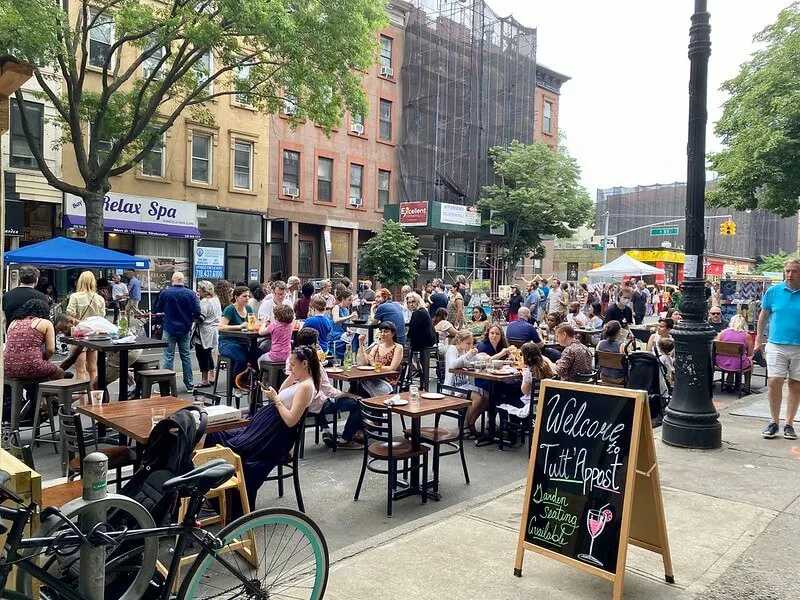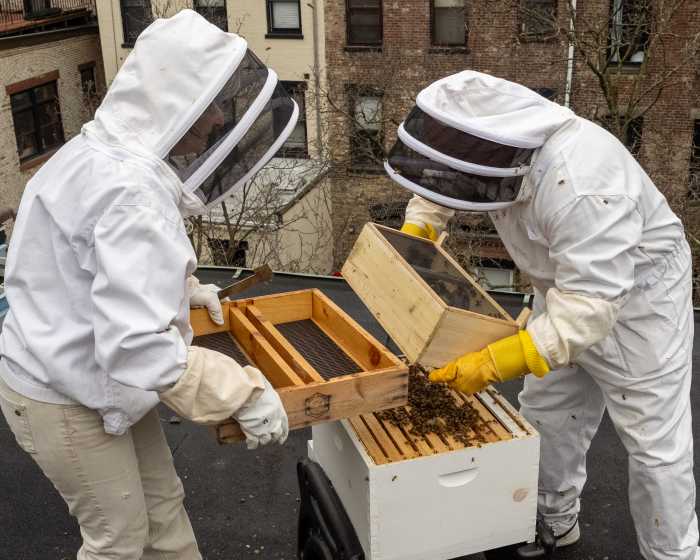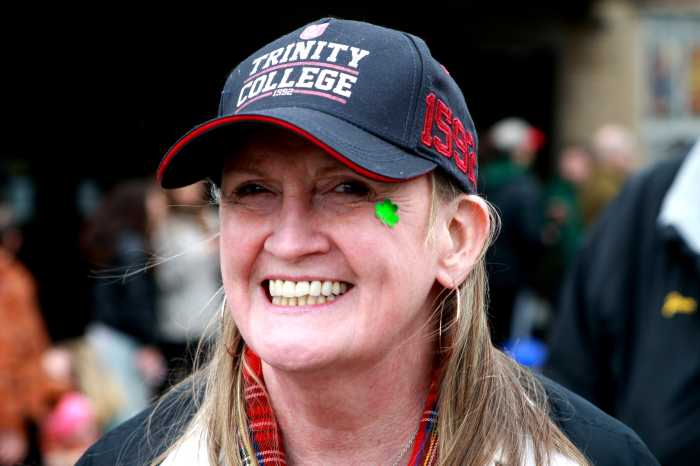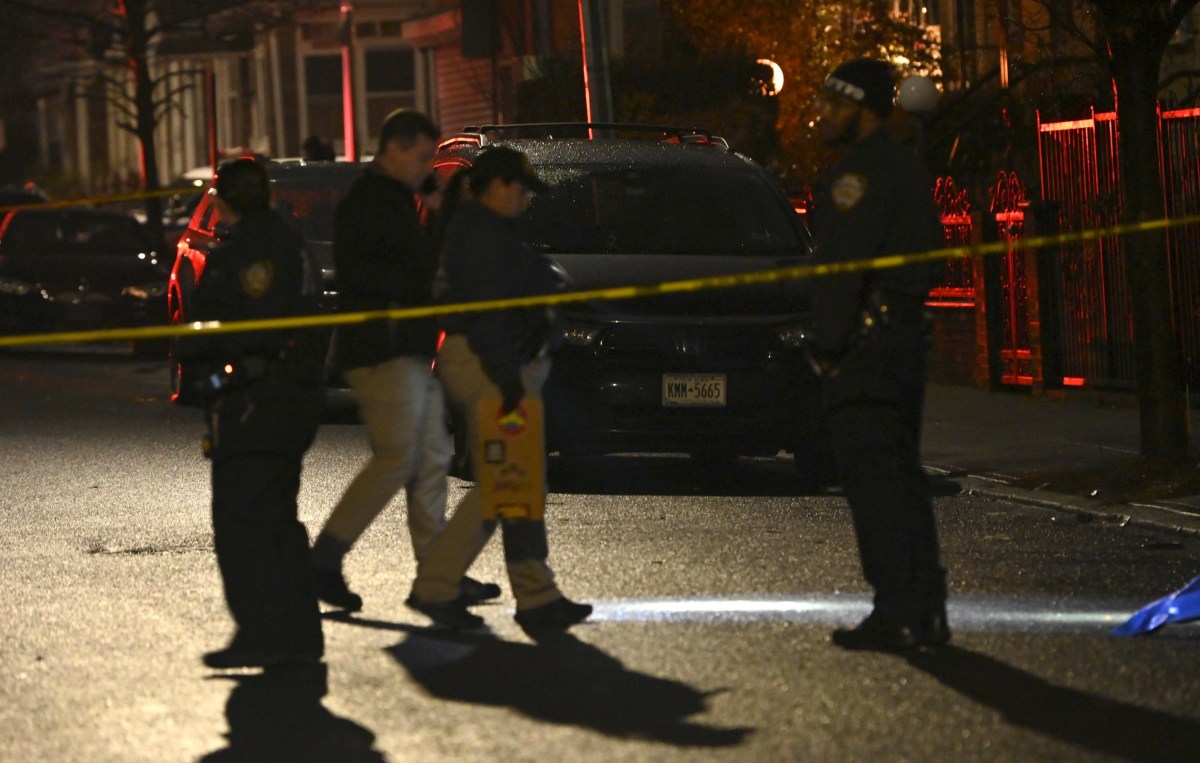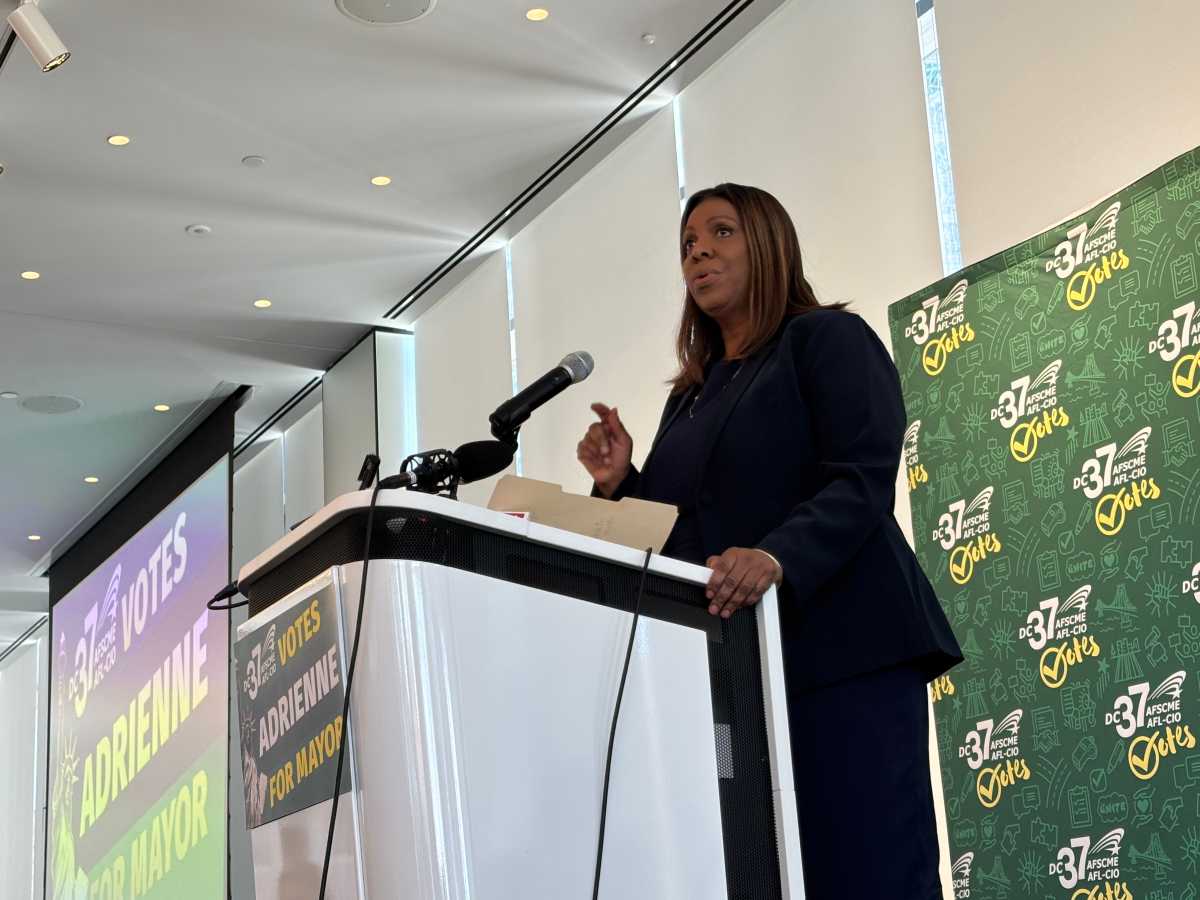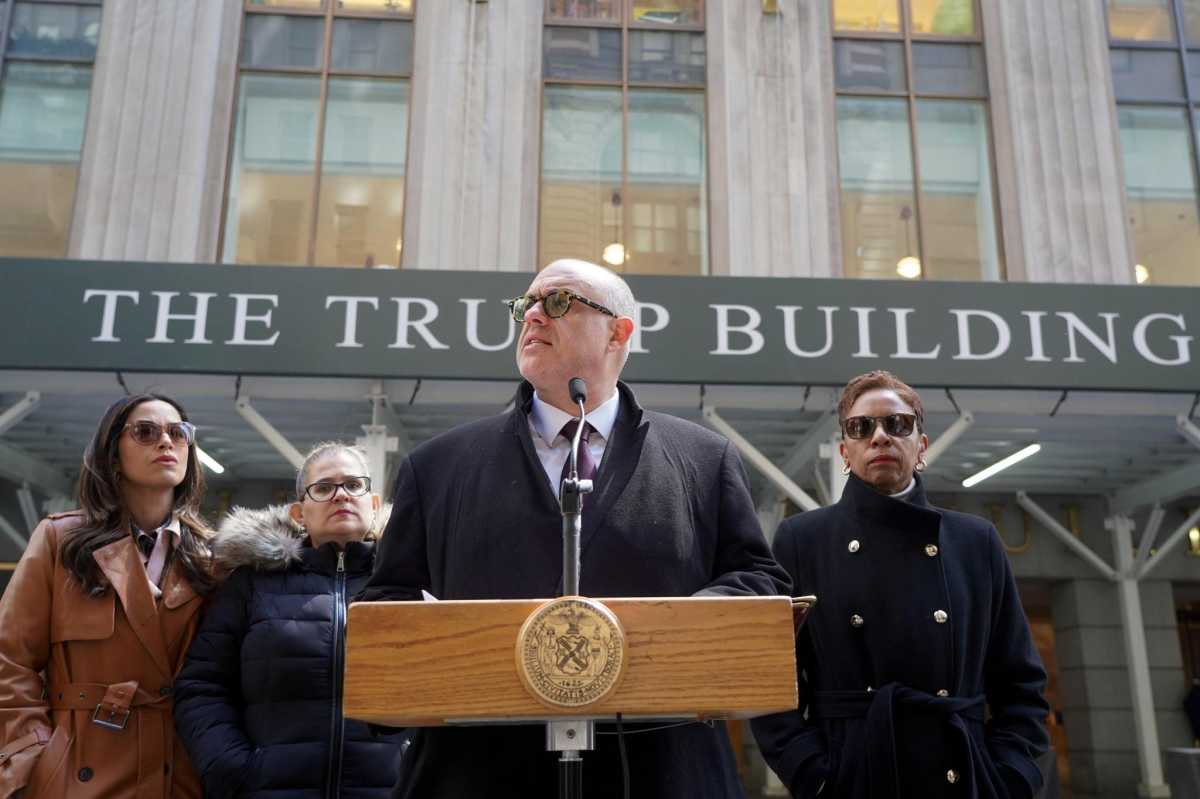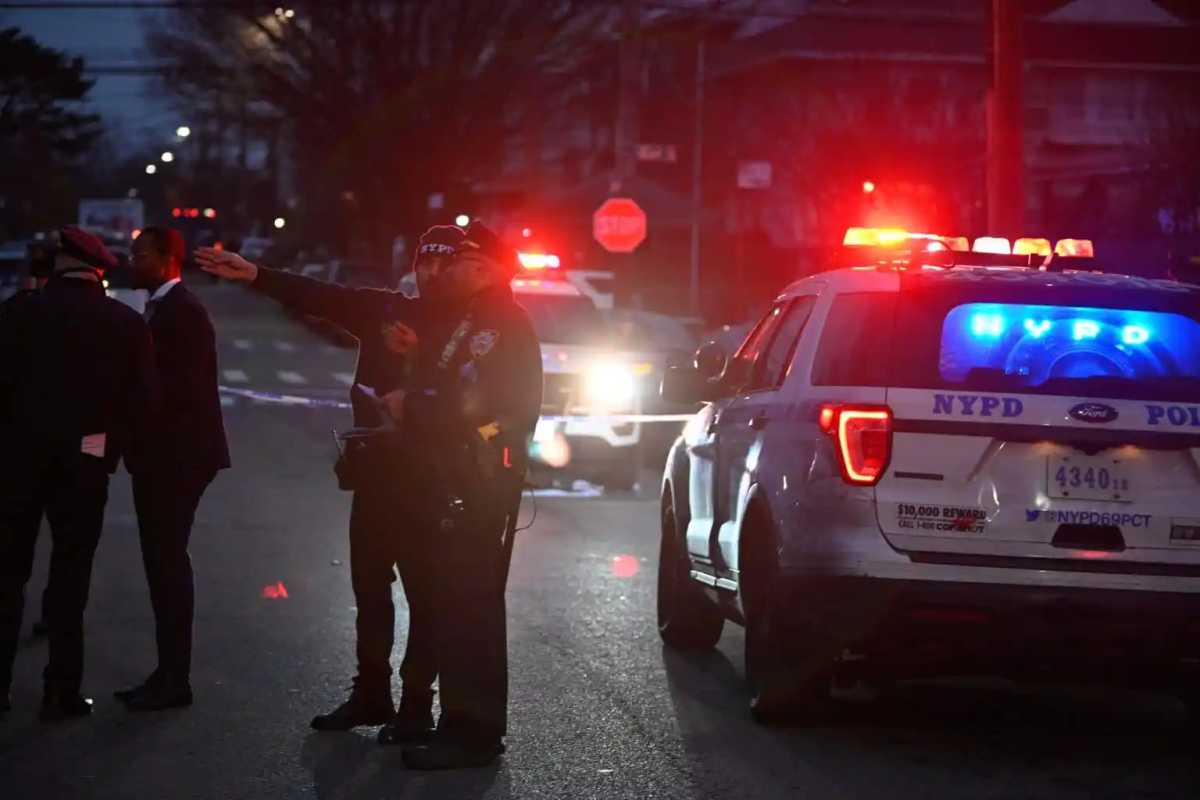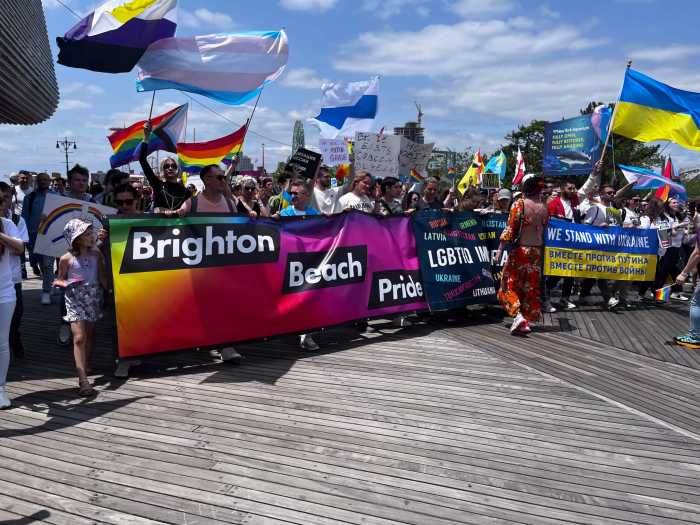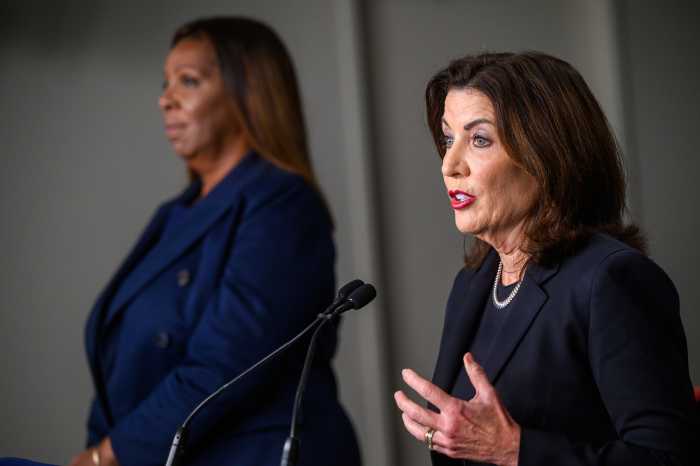As Park Slope’s Open Streets program awaits final approval from the Department of Transportation (DOT) for the 2025 season, local business owners along Fifth Avenue remain divided over its impact, with some fearing for their businesses’ viability.
To gauge public opinion, Community Board 6 and Council Member Shahana Hanif have launched a survey seeking input from residents and merchants on how they want the program to operate this year. The feedback will be presented to the DOT before final approval is granted.
Opposing merchants hope the survey will highlight the need for compromise, particularly around operating hours.
New York City’s Open Streets program began in April 2020 as a response to the COVID-19 pandemic. It was introduced to provide more outdoor space for socially distanced activities, including walking, cycling, and outdoor dining. Initially temporary, it has since become a permanent fixture in many neighborhoods due to its popularity.
This year’s volunteer-led application for Park Slope proposes closing Fifth Avenue from Union Street to Fourth Street every Saturday from 11 a.m. to 10 p.m. between May and October, with a break in August. The volunteer-led proposal follows the discontinuation of the Open Streets program in 2023 after the Park Slope Fifth Avenue Business Improvement District (BID) stepped back, citing negative financial impacts on businesses.
“Additionally, our organization could not make the case to continue the program due to capacity and funding challenges,” Joanna Tallantire, executive director of the Park Slope Fifth Avenue BID, told Brooklyn Paper.
To revive the program in 2024, a group of local merchants formed the Fifth Avenue Open Streets Merchant Association and secured sponsorship for a scaled-down version of the popular program.
Brendan Byrnes, owner of The Commissioner, and his wife Jessica Kausen spearheaded the effort and say they are securing sponsors for this year’s programming in an expanded catchment area. Last year, the stretch of Fifth Avenue from President Street to Second Street was the designated car-free zone every Saturday from May to November, with a break in August.
“Last year was great. We were able to do a good amount of programming in the second half of the season that families really spoke highly of, and we felt like it was a success,” Byrne said. “We went back to the DOT before our application this year, and they were enthusiastic about wanting us to apply again and continue the program.”
Survey says
The Fifth Avenue Open Streets Merchant Association — made up of the business owners of Annie Blue Ribbon, Burgers & Beers, Negrill, Calexico, and The Commissioner — carried out its own surveys ahead of the 2024 revival and this year’s return.
The 2025 community survey results, seen by Brooklyn Paper, showed overwhelming support for the program, with 455 out of 489 respondents in favor of its return, with respondents highlighting live music, outdoor dining, and family-friendly spaces as some of the key benefits. However, concerns were raised by about 7% of respondents who opposed the program, citing issues like traffic disruptions, business accessibility, and safety hazards from speeding e-bikes and delivery vehicles.
In the feedback collected by the Association from 2024 to early 2025, solely from Fifth Avenue merchants, 60% of respondents praised the initiative for increasing foot traffic and sales, while 30% saw significant losses, including some businesses suffering 50% drops in Saturday sales.
Notably, 75% of businesses excluded from the 2024 Open Streets zone expressed interest in joining a 2025 expansion, hoping to share in the benefits enjoyed by those on the closed blocks. Some of the critics — many just outside the designated zone — called for rotating closures to distribute economic impacts more fairly.
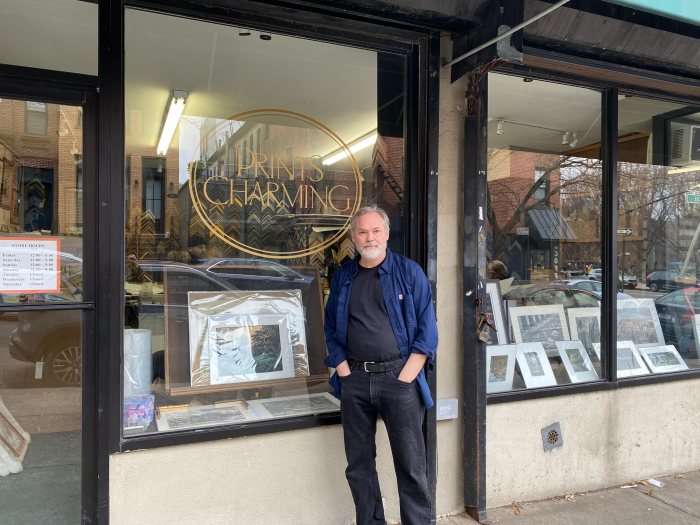
Several merchants south of Fourth Street who spoke to Brooklyn Paper claim the street closures are devastating their businesses.
Darrin VonStein, owner of the picture frame store Prints Charming, said his Saturday sales were essentially “wiped out” last year when the section of the avenue north of his store was partially closed, with at least one Saturday a month generating no sales.
“I’m this close to bankruptcy if I have to have one more year,” he said. “I averaged about a 15% loss on average for each month because of it. On top of you already assume a 15 to 20% loss during the summertime anyway, because there are fewer people around, so add another 15 to 20% on top of that, and most of those months, I couldn’t pay rent because this, because this program literally wipes out traffic coming into the neighborhood.”
“This should not be called Open Streets. It should be called Empty Streets,” he said, adding that rerouted buses and reduced vehicle access have cut foot traffic to his Fourth Street store.
When Open Streets was in effect on Saturdays from May 4 to Oct. 26 last year, the B63 did not serve stops from Atlantic Avenue to Ninth Street in both directions, and was instead detoured to Fourth Avenue.
Jaime McFarland and Scott Pugliese, owners of Bagel Villa, said their sale numbers show a clear drop in customers on Saturdays when Open Streets is in effect, compared to Sundays when the street remains open. McFarland said they want a compromise this year: limiting closures to later in the afternoon when most retail shopping is complete.
“It’s the smaller businesses, the service goods, hair salons, florists, wine shops, and retail shops. Those are the people that are suffering because even though it’s bringing out a certain group of people, they’re not doing their Saturday shopping,” she said. “That’s the bottom line.”
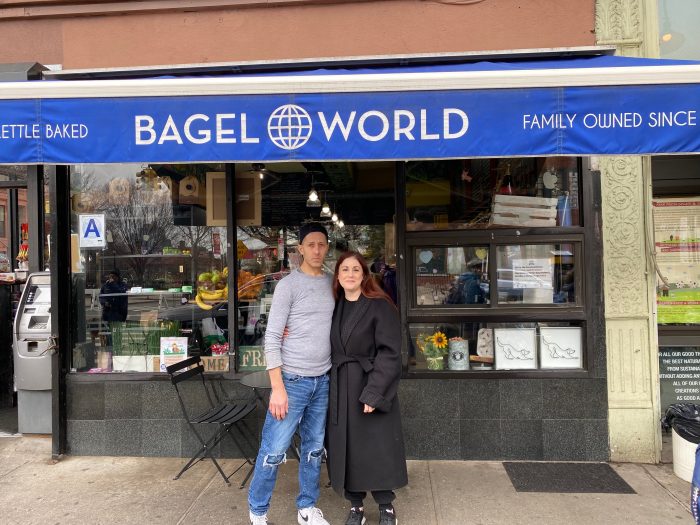
“I don’t think the community understands how much it’s hurting some of the businesses that they love,” McFarland added. “I think if their eyes were open to that, they would obviously not want to lose great places that they love going to.”
‘Some of us are really, really struggling’
In a petition addressed to the DOTand Council Member Hanif, merchants McFarland and Pugliese urged officials to reconsider the Open Streets program. The petition calls for a more thorough examination of the program’s financial impact on local businesses and the development of a recovery plan.
“Businesses in Park Slope cannot continue having restricted access to clients and customers from all parts of Brooklyn and its neighboring boroughs and states,” the petition reads. ”Businesses in Park Slope rely on the fact that Fifth Avenue is one of the longest, uninterrupted business corridors in all of New York City. When any part of that corridor is cut off, it has a negative impact not only on Park Slope, but also on adjacent business districts.”
Some businesses that have signed the petition so far include 390 Social, Square Stores, Chuzo Culture, Zuzu’s Petal, Simple Loaf Bakehouse, Foodtown, Curry Mee, Mura Sushi, Joe’s Pizza, Good Wine and Stone Park Cafe.
“I was afraid to be vocal, because I don’t want to come out as against the community,” Pugliese said. “But there are so many of us that the community is going to lose all its service stores and its great restaurants because this is to benefit a few people.”
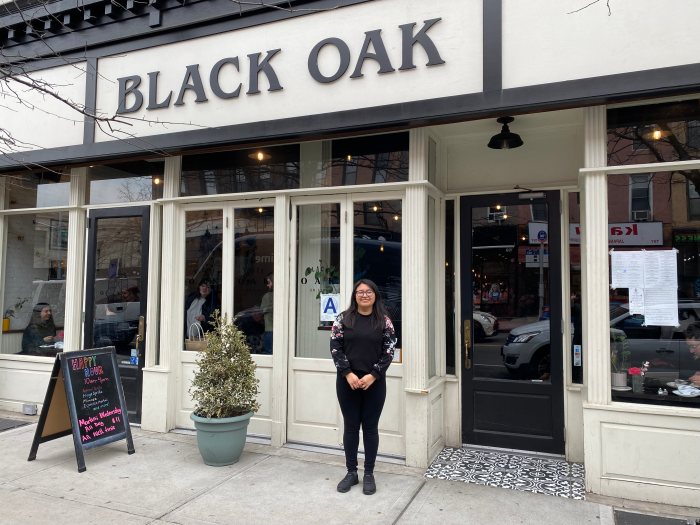
Another business on the list is Black Oak. Gloria Lopez, the co-owner of the restaurant, expressed frustration over the plan to run the shortened program again, saying that she fears she will have to close her doors for good. Despite repeatedly reaching out to program organizers and city officials, she said, her concerns have been ignored.
“Some of us are really, really struggling. We’re really trying to survive here,” she said. “We’ve been trying to get some sort of help, and like we’re just being turned away. We’re just given the runaround. January and February are supposed to be the slowest months, but I make more money on Saturday in January or February than I make in the summer, which is supposed to be busy; that is concrete evidence.”
An urge to hold tight
Community Board 6 District Manager Mike Racioppo said the survey will be open through April 15, but noted that the overall sentiment toward Open Streets has been positive and that complaints from merchants are a recent development.
“Open Streets has been helpful to businesses but also fluctuates in line with the general economy,” he told Brooklyn Paper. “A recommendation would be for the program to be properly funded and expanded — we’ve heard from merchants on Fifth Avenue whose frustration is that it doesn’t extend to their location.”
With the DOT yet to weigh its decision, business owners who oppose the program hope their concerns will be addressed through adjustments, such as later start times or a shortened season.
“It can’t be all or nothing,” McFarland said. “If there’s no compromise, we’re going to lose a lot of great businesses in this neighborhood.”
Byrnes stressed that nothing is final yet and that the Association is still considering everything to “[make] this program work as well as it can for the most number of people.”
“Across the city, everybody’s feeling the same thing where there are people against it, and there are people for it,” he said. “I think any kind of city initiative that creates change will get that.”
He urged all to remember that this isn’t the program’s first year in Park Slope.
“While it’s changed, we’re trying to improve it every year,” Byrnes said. “I think there are going to be some adjustments that will be made. We want to take all that feedback, use what the DOT will allow us to do and make the program as good as it can be for all the merchants and residents.”


